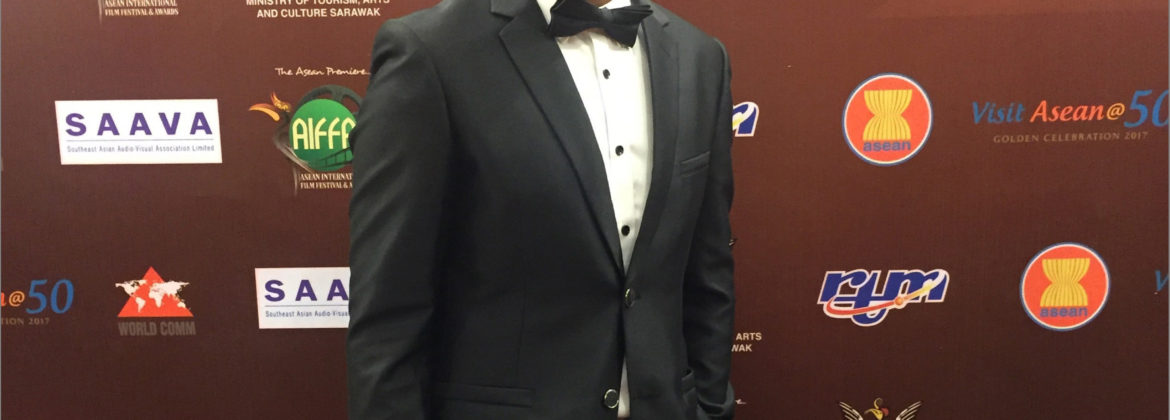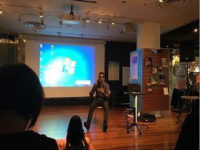Saleem Hadi – Local Filmmaker On World Stage
Saleem Hadi is one of the hidden gems in our Indian community today. He has done 16 short films to date and one of them, Take, has aired at the CANNES Film Festival and made him the first Singaporean to have won the Distinguished Community Documentary Award. Recently, his film, VIDHAI , aired at the ASEAN International Film Festival and Awards (AIFFA), a prestigious gala event which honours and promotes ASEAN filmmakers on a world stage. As director of BlacSpice Media, he also conducts media enrichment classes and workshops island wide. Saleem is also a passionate practitioner of theatre and has been part of productions both as a director and actor. We sat down with him to talk more about his upcoming projects, his early career and challenges faced as an independent filmmaker..
When did you realise that you wanted to become a filmmaker?
I was always very culturally connected with Indian activities since young and participated in lots of Tamil and Indian cultural activities in my schooling days. I started out in theatre actually and spent 8 years as part of the Ravindran Drama group where I was a scriptwriter and actor. At the same time, I was also heavily involved in the Indian Cultural society at Temasek Polytechnic and was part of many productions there as well. I fell into filmmaking by accident actually. Back when I was in polytechnic, there was this Canon DV fest that was held every year to showcase local short films which were fully funded for and there was prize money for the winning entry. There were more pros than cons taking part in it so I asked myself why not give it a shot.
My first short film was based on something I observed around me. I noticed that many people of my generation were losing their virginities in a very fickle manner and it wasn’t that big of a deal to them. The way I had been raised to think was that virginity was something to be guarded carefully for that one woman you are going to fall in love with . So that’s how I came up with the concept for Locked Within which is about the pressure that society places on an individual to lose his virginity.
What was the reception like for your first few films?
In fact, my first initial films were just shown to my own close friends or submitted for competitions. The production was raw but we always had a decent cast and scripting. Progressively, I began to expand my target audience and my content became bolder as well. In the past 5 years, my content has been more cultural and historical. But recently, I’ve been getting back to what I was doing before, grittier and bolder content such as in VIDHAI and KOLUSU.
What would you say was the turning your point in your filmmaking career?
It would have to be when my friends and I did a documentary which then won an award at the Cannes Film Festival. It all started while I was studying at SIM when one of my lecturers encouraged my class to enter the International Cannes Film Festival competition. Most of my classmates weren’t really interested but I was game for it, so I gathered my two friends and younger brother and did a 3-minute documentary about death. This was just after the earthquake hit Sichuan, China in 2008 and I found that the help and support lent by the mainstream press and people around me wasn’t reflective of the magnitude of such a tragedy. We decided to go out onto the streets and ask people about their views on death, filming and compiling their responses, all on a budget of $1 ! Little did we expect that this little documentary of ours would make us the first Singaporeans to bag the Cannes Distinguished Community Documentary Award for a short film. Doors started opening for me after that win.
Tell us more about your recent debut at AIFFA
When I submitted VIDHAI for AIIFA, I didn’t really expect anything to come out of it. I had many projects back to back at that time and didn’t really devote much time to marketing it. It was one of the films that I felt was very current and relevant to our community today and that’s why I decided to submit it for AIIFA. It was actually not supposed to be screened because I came in quite last minute and they told me that it might not be able to get approval from the censors in time. Only when I was at the event and I saw the schedule, did I realise that it was indeed going to be screened. I even got to talk about the film and the filmmaking process to the other filmmakers from the region and pitch my feature film idea to credible financiers.
Why do you choose to market your films online rather than on TV and radio?
Online platforms have worked for me very well. It makes me hungrier to achieve more when I have to market myself on my own. It pushes me to work harder and network with more people, establishing connections to publicise my projects.
What would you say are the biggest challenges that a local filmmaker faces today?
2 things. A conflict within himself, whereby he puts himself down by saying he’s not doing good enough and should just quit. That’s been a big demotivator for me personally. Second is the need to get proper acceptance from the public. I feel that even if the work is not that good, you shouldn’t turn the guy down immediately. If the media or the support system around the creator is welcoming and guides him, he will definitely be able to do good work. Instead of telling him that his work is bad, tell him how to improve on it. If a person just keeps telling you your works sucks without telling you what exactly is wrong with it, you should just move away. Such negativity does not help the creator in any way.
If only that support system is readily available, we can have lots of filmmakers from the Indian community itself. I’m actually hoping to create such a support system. For my recent event, KALAI MALAI, I chose to show five short films, one of which was made by a first-time filmmaker. His work was not fantastic but I told him that he is going to showcase his work and talk about it to the audience. This actually compelled him to start writing his second short film that night itself and he revealed to me that he had never received such a positive response to his work in his life. There needs to be a change in attitude among the Indian community and families need to become more supportive of aspiring filmmakers and their dreams. We need to help young people find their identity.
What advice would you give to young aspiring filmmakers?
Schools often encourage young people to play it safe. Don’t make films on gender, race, religion, inequality or politics. You know, I know, everybody knows. I’ve even been told by educational companies that when I’m teaching, to not sway towards that angle.
But what filmmakers need to realise is that if people have something strong to say, they can make some films on their own outside of school and Singapore’s not the only place where they can showcase their work. They can send their films out of Singapore. Rather than have a very opinionated idea about the topic, they should research thoroughly first and see how people respond to that particular issue. Every film is ultimately a filmmaker’s reflection of himself and his ideas but would you want just your vision alone or would you want an accumulation of viewpoints in your film? If you really believe in your story and want to communicate it to an audience, just go ahead. Don’t listen to any naysayers.
Why did you start conducting media enrichment classes?
In the past, I attended a lot of other programs in search of a proper education in film but realised that many of these classes in the market are not good. A lot of students are learning the wrong stuff and that was bothering me. So I started doing my own programs. Recently I’ve sought to get accredited by the government and applied for my programs to be listed under the National Arts Council directive which would allow schools across Singapore to include my programs in their curriculum. I’m happy to say I’ve succeeded in getting 9 of my programs accredited under this directive. I hope to eventually develop these programs into an enrichment academy and have actually been in talks with other countries in the region to include my programs in their schools as well.
What can we expect from you in the future?
My latest short film is KOLUSU , which is currently in post-production, and will be screened at an Indian community event in July. I’m also working on 2 documentary shorts for other organisations and am in the pitching process at the moment. A full-length feature film is also in the works and through it, I hope to tackle the issue of domestic abuse and bad childhood memories affecting one’s current temperament.
We also recently soft-launched THE INDBOX over the Tamil Language month, which is an online archive for local Indian short films. We are currently taking submissions and a full launch will be done next year by the Minister. We only have three conditions set for a submission, which is it must be in any Indian language, made in Singapore and under 30 minutes. I believe that each short film is someone’s identity and I want to collect all these identities and put them up as educational material for schools and individuals. As part of this initiative, I will also be conducting workshops, screenings and networking sessions for aspiring filmmakers ahead of the proper launch.
Theatre-wise, I have a production coming out this weekend, in fact. In 2015, we got the opportunity to stage VIZHUTHUGAL for the opening of Indian Heritage Centre (IHC) and CultureFest 2015. For CultureFest 2017, we are back to do THERUPORI which is an outdoor Tamil theatre production. I’m currently trying to get more people to come. It’s the least I can do for my actors who have put in about 3-4 months of work for this performance.
THERUPORI will held on May 13 & 14 from 7pm-8pm, right outside IHC. (https://www.facebook.com/events/424291241296659/)
CALLING ALL ASPIRING FILMMAKERS: You can submit your short film for INDBOX to sitfexplorers@gmail.com
Learn more about Saleem at www.saleemhadi.com
Source : theguru.sg





